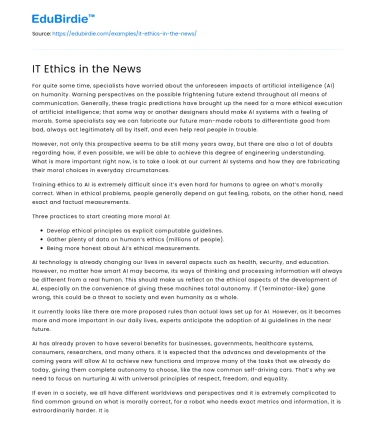For quite some time, specialists have worried about the unforeseen impacts of artificial intelligence (AI) on humanity. Warning perspectives on the possible frightening future extend throughout all means of communication. Generally, these tragic predictions have brought up the need for a more ethical execution of artificial intelligence; that some way or another designers should make AI systems with a feeling of morals. Some specialists say we can fabricate our future man-made robots to differentiate good from bad, always act legitimately all by itself, and even help real people in trouble.
However, not only this prospective seems to be still many years away, but there are also a lot of doubts regarding how, if even possible, we will be able to achieve this degree of engineering understanding. What is more important right now, is to take a look at our current AI systems and how they are fabricating their moral choices in everyday circumstances.
Save your time!
We can take care of your essay
- Proper editing and formatting
- Free revision, title page, and bibliography
- Flexible prices and money-back guarantee
Training ethics to AI is extremely difficult since it’s even hard for humans to agree on what’s morally correct. When in ethical problems, people generally depend on gut feeling, robots, on the other hand, need exact and factual measurements.
Three practices to start creating more moral AI:
- Develop ethical principles as explicit computable guidelines.
- Gather plenty of data on human’s ethics (millions of people).
- Being more honest about AI’s ethical measurements.
AI technology is already changing our lives in several aspects such as health, security, and education. However, no matter how smart AI may become, its ways of thinking and processing information will always be different from a real human. This should make us reflect on the ethical aspects of the development of AI, especially on the convenience of giving these machines total autonomy. If (Terminator-like) gone wrong, this could be a threat to society and even humanity as a whole.
It currently looks like there are more proposed rules than actual laws set up for AI. However, as it becomes more and more important in our daily lives, experts anticipate the adoption of AI guidelines in the near future.
AI has already proven to have several benefits for businesses, governments, healthcare systems, consumers, researchers, and many others. It is expected that the advances and developments of the coming years will allow AI to achieve new functions and improve many of the tasks that we already do today, giving them complete autonomy to choose, like the now common self-driving cars. That’s why we need to focus on nurturing AI with universal principles of respect, freedom, and equality.
If even in a society, we all have different worldviews and perspectives and it is extremely complicated to find common ground on what is morally correct, for a robot who needs exact metrics and information, it is extraordinarily harder. It is imperative that we start focusing on making artificial intelligence ethical before it’s too late.






 Stuck on your essay?
Stuck on your essay?

